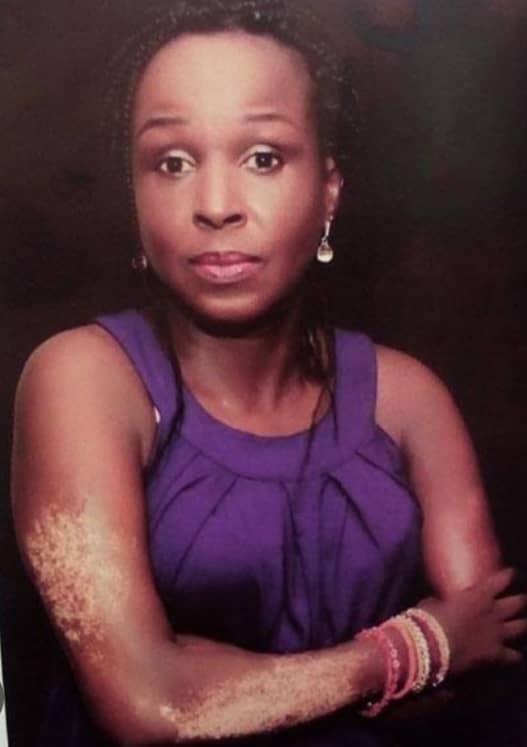Reeling through her life’s journey with scleroderma, Elizabeth Onuoha-Ozumba, survivor and author of the book, Living with Scleroderma, talks to JOKE KUJENYA about the life-threatening disease that many people are not aware of
Discovery and diagnosis
Elizabeth Onuoha-Ozumba’s personal odyssey with a perplexing disorder began with strange sensations that infiltrated her body back in 2010. Although, she didn’t immediately connect the dot, the fingers on her right hand began to swell, just as her face spotted peculiar, shiny patches.
These unexplained physical changes accompanied a period she was preparing for her Higher National Diploma (HND) exams in Mass Communications at the Nigerian Institute of Journalism (NIJ), Ogba, Lagos.
Elizabeth, driven and determined to complete her studies, brushed off these early symptoms, attributing them to the stress of her impending exams. However, her experience took a distressing and painful turn in December 2010 when excruciating pain in her right hand, wrist, fingers and up to her elbow became unbearable.
Also, her absence at a significant event caught the attention of a close friend who’s been like a mother to her for years. Upon sharing her ordeal, the friend directed her to the haematology clinic at the Federal Medical Centre in Ebute-Metta, Lagos.
However, the initial round of tests did not yield any clear answers, but Elizabeth knew deep within herself that something was amiss. She insisted on further investigation, leading to other series of comprehensive tests that eventually led to the collection of her blood samples at MeCure Laboratory in Oshodi, taken all the way to India for thorough analysis.
The results, on return to Nigeria about a week later, confounded her and her healthcare provider.
Ushered into a fateful meeting at the FMC, the doctor delivered the startling diagnosis of Scleroderma. Also known as systemic sclerosis, scleroderma is a chronic, autoimmune disease with a multi-system vasculopathy and an immense increase of fibrous tissue in affected organs,” according to the National Institutes of Health.
Bewildered and concerned, Elizabeth queried her doctor for more information. She was sensitized on the scary fact that her immune system had inexplicably turned against her body, causing an autoimmune disorder where her body waged war against itself.
Each day of Elizabeth’s life entails a relentless fight against an overactive immune system
But the specifics of why her immune system had betrayed her and initiated an assault on her own tissues remained a medical mystery for her. She just vividly recalled that it gave her a feeling of wearing a steel jacket as if her skin could not breathe as easily as it used to.

Elizabeth was soon referred to the Pathology Clinic at the Lagos State Teaching Hospital (LUTH), Idi-Araba, Lagos, where her arduous journey truly commenced. Faced with a life-threatening diagnosis, emotional turmoil, and the ominous unreliability of Nigeria’s healthcare system, she set forth on a path of self-discovery, resilience and tenacity into the strange world of scleroderma, an enigmatic autoimmune condition, which eventually turns out to be a slippery adversary.
Fighting in an exacting terrain
Meeting Dr. Ayesha Akinkugbe at the dermatology clinic in LUTH marked a turning point in Elizabeth’s struggle. The empathetic and compassionate dermatologist introduced her to the realm of rheumatology and she encountered brilliant medical minds who provided her a glimmer of hope amid the bleak reality of her rare and incurable condition.
And though there is no known cure for scleroderma, a cocktail of medications and treatments offered her a lifeline. The medicals shifted focus to symptoms management and the mitigation of their impact on Elizabeth’s life.
Thirteen years into the battle with scleroderma, Elizabeth has managed to tame the beast that once threatened to consume her.
Daily battle with scleroderma
Each day of Elizabeth’s life entails a relentless fight against an overactive immune system, though. To cope, immunosuppressant medications are her frontline defense, ensuring that her immune system’s aggressiveness is subdued.
However, this approach, too, comes with its own set of challenges, as suppressed immunity leaves her susceptible to other infections.
scleroderma’s impact extends far beyond physical symptoms. It permeates every aspect of life, including social interactions and daily routines
Also, the onset of COVID-19 pandemic presented its own unique set of challenges for Elizabeth. Like others living with scleroderma, she was forced into self-isolation to protect herself from potential exposure to the deadly virus. And while she saw acquaintances tragically lost their lives during this time, she confessed the reality of underscoring the dire need for awareness and support for scleroderma patients.
Life upturned in every facet
As noted by Elizabeth, scleroderma’s impact extends far beyond physical symptoms. It permeates every aspect of her life, including social interactions and daily routines. The condition left her feeling like an outcast, as several people misjudged her condition, perceiving it as contagious.
In fact, her wardrobe had to adapt to conceal the patches on her skin, and the sunbeam became both an ally and a foe. Elizabeth recounts that dressing herself became a challenge, and bathing or going to the bathroom became time-consuming tasks.
Even her food choices had to realign with her body’s new reality. Elizabeth said spicy foods, in particular, had to be approached with caution. Large meals became uncomfortable, with digestion woes a constant companion.
Adapting to this new way of life involved a myriad of adjustments, from using an umbrella and sunscreen to protect her skin from the sun’s harsh rays to wearing low-heeled shoes to accommodate her limited mobility.
Quest for support in Nigeria
Scleroderma, while rare, does have a presence in Nigeria. Elizabeth is part of a community of individuals living with this condition, and they gather at medical facilities like LUTH and LASUTH, where healthcare professionals offer specialized care.
Despite the dedication of the medical experts and the efforts of the scleroderma community, Elizabeth said government support remains elusive.
Her new way of life involves a myriad of adjustments, from using umbrella and sunscreen to protect her skin from the sun’s harsh rays, to wearing low-heeled shoes to accommodate her limited mobility
To boost this, she said she and a Zambian friend, also a Scleroderma survivor, embarked on campaigns and initiatives to create more awareness, with limited success in securing government funding or media exposure.
Emotional toll
Sighing, Elizabeth notes that scleroderma takes a toll, not just on the body, but also one one’s emotional and psychological well-being. The condition leaves individuals feeling isolated, as they watch life pass them by. It becomes a challenge to relate to a world that seems oblivious to their suffering. And while there are moments of endless tears, there is also an unyielding spirit that has kept her moving forward, knowing she hasn’t reached the end of her life’s journey.
Personal chronicle
For Elizabeth, she had, and still has the warm love and supports of families and friends to thank for boosting her staying power. She said that’s the reason she chose to share her story through a book to dispel misconceptions and provide clarity in a world where misinformation often runs rampant.
“I have faced blames of witchcraft and spiritual attacks, and I decided to illuminate the realities of Scleroderma as a rare and ancient medical condition. I believe that my book serves as a beacon of accurate knowledge and for those who, like me, confront this life-altering condition.”
Costs and challenges
On the financial burden of scleroderma, she admits: “It is substantial. How do I recap it?” She asks no one in particular. “Specialists’ visits. Medications. Purchase of endless cocktail of numerous products for symptoms management add up too quickly. And a fluctuating exchange rate as well as the need for continuous medical tests exacerbate the expenses. And the costs are often insurmountable without a robust support system in place.
Specialists’ visits. Medications. Purchase of endless cocktail of numerous products for symptoms management add up too quickly to complicate the financial burden
Fight for awareness
While her efforts to secure government’s funding have met with limited success, Elizabeth’s journey navigates self-initiated advocacy and awareness campaigns. She, and fellow scleroderma warriors persist in their mission to educate the public as they keep pushing for support.
Family and relationships
“Let me tell you,” She said calmly; “Scleroderma treatments can sometimes affect a woman’s reproductive system.” So, coping with the emotional and physical can strain relationships and alter family dynamics.
A never-ending battle
Elizabeth described her story as a testament to the unyielding human spirit. Yet, her battle with scleroderma remains a daily struggle. She said she has had to make profound changes to accommodate her new reality. And despite the immense challenges, she remains determined to make the most of her present, and future life, one day at a time.
However, while scleroderma remains a condition that defies easy categorization and holds the ace to transform lives, Elizabeth says, “I transcend it.”


